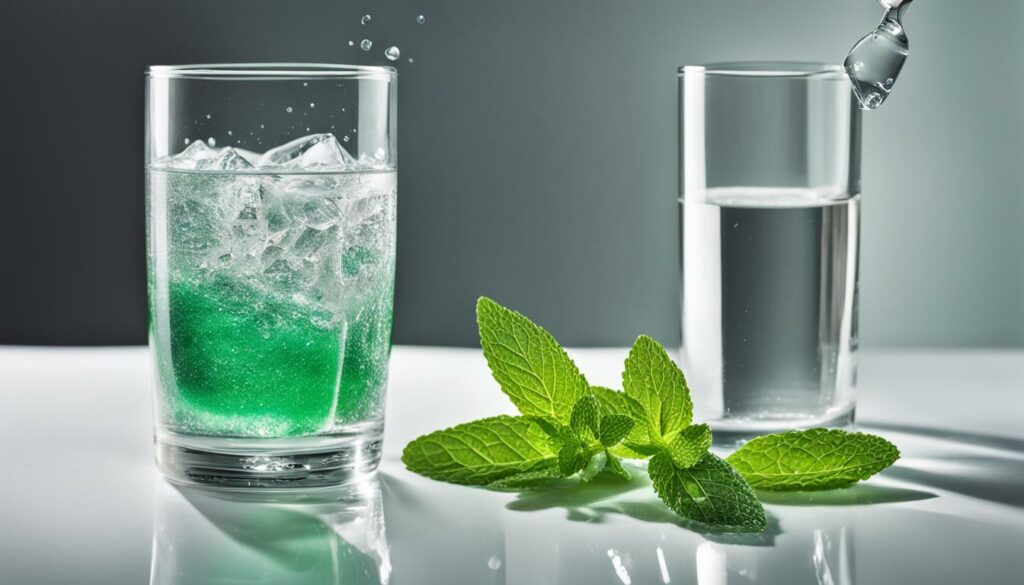Welcome to our comprehensive guide to conquering bad breath! If you’re struggling with this common problem, you’re not alone. Bad breath, or halitosis, can have a significant impact on your oral hygiene, as well as your confidence in social situations. But don’t worry, we’ve got you covered!
In this article, we’ll explore the common causes of bad breath, the importance of maintaining good dental hygiene, and expert tips for achieving and maintaining fresh breath throughout the day. We’ll also discuss natural remedies and over-the-counter products that can help combat bad breath, as well as lifestyle changes that can contribute to better breath.
To get us started, let’s take a closer look at the causes and effects of bad breath.
Key Takeaways
- Bad breath, or halitosis, can have a significant impact on your oral hygiene and confidence.
- This comprehensive guide will explore the causes of bad breath and provide expert tips and remedies for conquering it.
Understanding Bad Breath: Causes and Effects
Bad breath, also known as halitosis, is a common oral health issue that affects people around the world. It’s a condition that can lead to self-consciousness, social anxiety, and embarrassment. Understanding the causes and effects of bad breath is key to conquering it for good.
The Causes of Bad Breath
There are several causes of bad breath, including:
- Poor oral hygiene: Not brushing and flossing your teeth properly can cause food particles to get trapped in your mouth, leading to bad breath.
- Food and drink: Certain foods and drinks, such as garlic, onions, coffee, and alcohol, can cause temporary bad breath.
- Smoking: Smoking and other tobacco products can leave a foul smell in your mouth that can linger for hours.
- Underlying medical conditions: Bad breath can be a symptom of underlying medical conditions, such as dry mouth, sinusitis, and digestive issues.
The Effects of Bad Breath
Bad breath can have several negative effects on your life, including:
- Low self-esteem and confidence: Bad breath can make you feel self-conscious and less confident in social situations.
- Difficulty building relationships: Bad breath can be a major turn-off for others and can make it difficult to build relationships.
- Oral health issues: Bad breath can be a sign of poor oral hygiene, which can lead to other oral health issues such as cavities and gum disease.
Understanding the causes and effects of bad breath is the first step in conquering it. In the following sections, we will explore expert tips, natural remedies, and over-the-counter products that can help combat bad breath and promote fresh breath.

The Importance of Dental Hygiene
One of the most crucial steps in conquering bad breath is maintaining good dental hygiene. Taking care of your teeth and gums can prevent food particles from getting trapped in your mouth and causing mouth odor. Additionally, it can also prevent gum disease and tooth decay, which are major contributors to bad breath.
To maintain good dental hygiene, make sure to brush your teeth twice a day for at least two minutes each time. Use a fluoride toothpaste and brush all sides of your teeth, including the back. Don’t forget to brush your tongue as well, which can harbor bacteria and cause bad breath. Floss daily to remove any food particles that may be stuck in between your teeth.
Another important aspect of dental hygiene is visiting your dentist regularly. Dentists can help identify any dental issues that may be contributing to bad breath and provide appropriate treatment. Additionally, they can also perform regular cleanings to remove any stubborn plaque or tartar that you may have missed during your daily oral care routine.

By maintaining good dental hygiene habits and visiting your dentist regularly, you can prevent bad breath and promote overall oral health.
Expert Tips for Fresh Breath
To achieve and maintain fresh breath, there are a number of expert tips you should consider.
Drink plenty of water: Staying hydrated helps prevent dry mouth, a common cause of bad breath. Aim for at least eight glasses of water a day.
Chew sugar-free gum: Chewing gum stimulates saliva production, which helps wash away food particles and bacteria. Look for sugar-free options to avoid promoting tooth decay.
Avoid certain foods and drinks: Some foods and drinks, such as garlic, onions, and coffee, can contribute to bad breath. Try to limit your intake of these items.

Brush and floss regularly: Brush your teeth twice a day and floss at least once a day to remove food particles and bacteria that can cause bad breath.
Clean your tongue: Bacteria can also accumulate on your tongue, so be sure to clean it by using a tongue scraper or brushing it with your toothbrush.
Use an antibacterial mouthwash: Mouthwash can help kill bacteria and freshen your breath, but make sure to use one that is specifically designed to combat bad breath.
By incorporating these expert tips into your daily routine, you can keep your breath fresh and your mouth healthy!
Natural Remedies for Bad Breath
If you’re looking for a natural solution to bad breath, try incorporating these remedies into your daily routine:
| Remedy | Description |
|---|---|
| Rinsing with Saltwater | Mix one teaspoon of salt into a glass of warm water. Gargle and swish the solution in your mouth for 30 seconds before spitting it out. Saltwater helps to neutralize odors and kill bacteria in the mouth. |
| Using Baking Soda | Mix one teaspoon of baking soda with a glass of water and swish the solution in your mouth for 30 seconds before spitting it out. Baking soda helps to balance the pH levels in the mouth and reduce odors. |
| Herbal Mouthwashes | Many herbs have antibacterial properties that can help freshen breath. Look for mouthwashes containing herbs like peppermint, sage, or clove. |
It’s important to note that while these remedies can be effective in combating bad breath, they should not replace regular dental hygiene practices. Be sure to continue brushing and flossing regularly, and visit your dentist for routine cleanings.

Remember, natural remedies can be a helpful addition to your oral hygiene routine, but it’s important to consult with your dentist or doctor if you experience persistent bad breath or other oral health issues.
Over-the-Counter Products for Bad Breath
If you’re looking for a quick and convenient solution to combat bad breath, there are plenty of over-the-counter products available. Mouthwashes, sprays, and lozenges are all effective options to freshen your breath on-the-go.
| Product Type | Pros | Cons |
|---|---|---|
| Mouthwashes | Easy to use; can kill bacteria and neutralize odors in the mouth. | Some mouthwashes contain alcohol which can cause dry mouth; not a long-term solution to bad breath. |
| Sprays | Convenient to carry around; can provide quick fresh breath. | Some sprays contain a high amount of sugar and may not be suitable for individuals with diabetes; may mask bad breath instead of eliminating the root cause. |
| Lozenges | Contain breath-freshening ingredients that can combat bad breath; may help stimulate saliva production. | Some lozenges contain sugar and may not be suitable for individuals with diabetes; not a long-term solution to bad breath. |
When choosing an over-the-counter product for bad breath, be sure to read the label carefully and opt for products that are sugar-free and alcohol-free if possible. It’s also important to remember that these products provide temporary relief and should not replace good oral hygiene practices in the long run.

Remember: Over-the-counter products are a great option for freshening your breath in a pinch, but they should not be relied on as a long-term solution. Regular brushing, flossing, and tongue cleaning are crucial for maintaining good oral hygiene and preventing bad breath.
When to Seek Professional Help
If you have persistent bad breath despite following good oral hygiene practices, it may be time to seek professional help. A dental professional can help diagnose the underlying cause of your bad breath, which may be related to dental issues such as gum disease, cavities, or dry mouth.
In some cases, bad breath may be a symptom of a more serious medical condition, such as respiratory infections, liver or kidney disease, or diabetes. If your dentist suspects that an underlying medical condition is causing your bad breath, they may refer you to a medical professional for further evaluation and treatment.
Whether your bad breath is related to a dental or medical issue, seeking professional help is important for getting proper treatment and ensuring that your oral and overall health are not at risk.

The Importance of Lifestyle Changes for Better Breath
If you’re looking to conquer bad breath, making certain lifestyle changes can be incredibly helpful. Here are some tips:
- Quit smoking: Tobacco products are notorious for causing bad breath. If you’re a smoker, consider quitting to improve your overall oral health and eliminate the unpleasant odor.
- Reduce alcohol consumption: Alcohol can dry out your mouth and lead to bad breath. Be mindful of how much you drink and consider cutting back if necessary.
- Manage stress: Stress can cause dry mouth, which can in turn lead to bad breath. Finding ways to manage stress such as exercising, meditation, or talking to a therapist can help improve your overall oral health.
Implementing these lifestyle changes along with maintaining good dental hygiene can help you achieve and maintain fresh breath.

“If you’re looking to conquer bad breath, making certain lifestyle changes can be incredibly helpful.”
Diet and Bad Breath
What you eat can have a significant impact on your breath. Certain foods and drinks can leave a lingering odor in your mouth, while others can promote fresh breath. To combat bad breath caused by your diet, consider incorporating the following foods into your meals:
- Crunchy fruits and vegetables, such as apples and carrots, can help scrub away food particles and bacteria that cause bad breath.
- Yogurt contains probiotics that can balance the bacteria in your mouth and prevent the growth of odor-causing bacteria.
- Green tea contains compounds that can reduce the production of volatile sulfur compounds, which contribute to bad breath.
On the other hand, there are certain foods and drinks that you should avoid to prevent bad breath. These include:
- Coffee and alcohol can contribute to dry mouth, which leads to bad breath.
- Sugary and acidic foods can promote the growth of bacteria in your mouth and contribute to bad breath.
- Garlic and onions contain sulfur compounds that can linger in your mouth and cause bad breath.
By making small changes to your diet, you can promote fresh breath and prevent bad breath caused by your food choices.

Maintaining Good Oral Health Habits
Now that you know the causes and remedies for bad breath, it’s important to maintain good oral health habits to prevent it from coming back. Here are some key takeaways:
- Brush your teeth twice a day for two minutes with fluoride toothpaste.
- Floss once a day to remove food particles and plaque from between your teeth.
- Clean your tongue daily with a tongue scraper or your toothbrush to remove bacteria buildup.
- Drink plenty of water to keep your mouth hydrated and prevent dry mouth.
- Avoid foods and drinks that cause bad breath, such as garlic, onions, and alcohol.
- Quit smoking and avoid using tobacco products.
- Manage stress through exercise, meditation, or other relaxation techniques.
- Eat a balanced diet rich in fruits, vegetables, and lean protein to promote good oral and overall health.
By incorporating these habits into your daily routine, you can maintain fresh breath and good oral health for years to come.

Image source: seowriting.ai
Conclusion
Congratulations! You now have the knowledge and tools to conquer bad breath and achieve fresh breath that lasts all day. Remember, maintaining good oral hygiene habits is the key to preventing bad breath in the long term.
Make sure to brush your teeth twice a day, floss daily, and clean your tongue to remove any food particles or bacteria that can cause bad breath. Incorporate expert tips such as drinking plenty of water and chewing sugar-free gum throughout the day.
If you suffer from persistent bad breath, don’t be afraid to seek professional help. A dentist or doctor can diagnose and treat any underlying conditions that may be contributing to your halitosis.
Finally, remember that lifestyle habits such as quitting smoking, reducing alcohol consumption, and managing stress can have a positive impact on your overall oral health and fresh breath. With these tips and reminders, you can confidently conquer bad breath and enjoy the benefits of a clean, fresh mouth!
FAQ
Q: What causes bad breath?
A: Bad breath can be caused by a variety of factors, including poor oral hygiene, food particles trapped in the mouth, tobacco use, dry mouth, certain medical conditions, and certain foods and drinks.
Q: How can I improve my dental hygiene?
A: To improve your dental hygiene, make sure to brush your teeth at least twice a day, floss daily, clean your tongue, and use mouthwash. It is also important to visit your dentist regularly for check-ups and cleanings.
Q: How can I achieve fresh breath throughout the day?
A: You can achieve fresh breath throughout the day by practicing good oral hygiene, drinking plenty of water, chewing sugar-free gum, and avoiding foods and drinks that can contribute to bad breath.
Q: Are there natural remedies for bad breath?
A: Yes, there are natural remedies for bad breath. Some examples include rinsing with saltwater, using baking soda, and using herbal mouthwashes. These remedies can help combat bad breath and improve oral hygiene.
Q: What over-the-counter products can I use for bad breath?
A: There are various over-the-counter products available for treating bad breath, such as mouthwashes, sprays, and lozenges. It is important to choose products that are specifically designed to target bad breath.
Q: When should I seek professional help for bad breath?
A: If you have persistent bad breath despite practicing good oral hygiene, it is recommended to seek professional help. Dentists, periodontists, and doctors can help diagnose and treat underlying dental or medical conditions that may be causing bad breath.
Q: Can lifestyle changes improve bad breath?
A: Yes, lifestyle changes can contribute to better breath. Quitting smoking, reducing alcohol consumption, managing stress, and maintaining a healthy diet can all help improve bad breath and overall oral health.
Q: What role does diet play in bad breath?
A: Diet can have an impact on bad breath. Certain foods and drinks, such as onions, garlic, and coffee, can contribute to bad breath. However, there are also foods that promote fresh breath, such as crunchy fruits and vegetables, yogurt, and green tea.
Q: How can I maintain good oral health habits?
A: To maintain good oral health habits, it is important to continue practicing good dental hygiene, visit your dentist regularly, implement lifestyle changes for better breath, and follow a balanced diet. These habits will help prevent bad breath in the long term.
